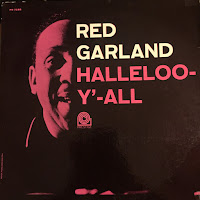I don't know what Garland's religious leanings were, but this is hardly a sanctified album. He doesn't reach into the musical language of the church the way Ray Charles does, or the way singers like Otis Redding would. Garland is a jazzman through and through, and this is a jazz album, with Garland's signature block chords finding new voicings that almost remind one of that other great block chordist, Thelonious Monk, although Garland's voice, even when he's reaching outside what has been his comfort zone, is very much his own.
Art Taylor continues to be his go-to drummer, and Sam Jones, who first joined him for 1959's Red in Bluesville, is back on bass. As he did with Paul Chambers, Garland gives Jones plenty of room to express himself, and Jones comes through.
The gospel-tinged originals and the spiritual represent the first half of this Friday With Rudy. The second half is mostly given over to other composers: Harold Arlen for "Blues in the Night." Duke Ellington for "Rocks in my Bed," Bennie Benjamin (whose hits ranged from "I Don't Want to Set the World on Fire" in 1941 to "Don't Let Me Be Misunderstood" in 1977) for "I'll Never Be Free."
The session had two distinct themes and produced two distinct albums, with "I'll Never Be Free" the only one from the second group to join the gospel-y titles on 1960's Halleloo Y'All. One more Garland original, "Soul Burnin'," became the title tune of the second album, which included a couple of cuts from a 1961 session with Oliver Nelson, and was released in 1964, when soul music was really burnin'.
Esmond Edwards produced.


No comments:
Post a Comment